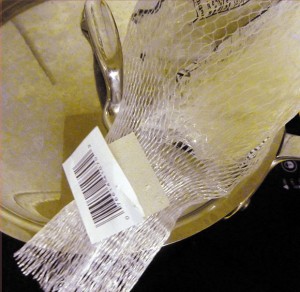Mindfulness: A Terrible Thing To Waste
The other day, while preparing chicken-flavored squash and long-rice soup, I found myself extracting a tiny staple from a small paper label that secured a bag of noodles.
That’s absurd! And I don’t mean making the squash soup, which is deliciously sensible. I mean going out of my way to remove the metal fastener so I can recycle the 4-square-inch piece of paper, when sometimes I throw away an entire sheet of 8.5-by-11 — 23.4 times bigger, to be exact— into the trash every time I’m not near a paper-recycling bin.
But at least I try to recycle. I try because I believe in its merits. Come to think of it, it can be a way of life that leads to happiness.
What? Happiness? You mean it’s possible to achieve mortal happiness by simply salvaging our trash?
Think of recycling as a type of meditation, though not the type that puts you into a zone of nothingness because we don’t want to achieve nothing. No, we want to achieve heaven on earth since we’re here anyway. Try this for a start:
FOCUS on what Kauai’s drop-off recycling centers generously accept from us: newspaper, glass, cardboard, paper, and plastics labeled “1” and “2.” Also, think about redeeming HI-5 glass and plastic bottles.
RELAX and breathe.
Don’t be overwhelmed to where you don’t want to do it at all, like extreme dieting and exercise. We should all know that one by now.
VISUALIZE the items separated. Take out six large paper grocery bags, open their mouths wide and place them right smack on your kitchen floor, accessible and visible. Know that those bags always are there waiting, even if they look messy, like mine. Most people (probably not me) eventually will develop a sleek system customized to fit their lifestyle.
APPRECIATE each and every recyclable item, thanking it for serving you by making sure it is clean and/or neat. Rinse out plastics and bottles and discard caps. Take boxes apart and fold them as flat as you can, like doing reverse origami, a fun Japanese paper-folding craft. Gratitude brings joy to the task.
RESPECT each item and deposit it in its proper place, as each deserves to be in its element.
LISTEN to your inner voice. The more items you recycle, the more you will drive to the recycling and redemption centers. To reduce your trips, you might become more discerning as to the quality and quantity of items you are purchasing, consuming or using. Get this: You not only will be recycling, but also potentially reducing the need to recycle!
GIVE BACK to the earth, especially if you have a backyard. Keep a handy bucket near your sink for compostables, like veggie/fruit peelings, leftover beans and fish and coffee grounds — no dairy, meats, breads and sweets. Take an invigorating walk to your composting site, delighted that you are reducing your trash and fertilizing the soil with vital nutrients.
The result of this meditative recycling session?
Each person should end up with, at most, one grocery bag full of disposable trash per week. You won’t even need the county’s downsized 64-gallon roadside trash cart that gets implemented next July! Wouldn’t that be progress on an island with limited dump sites?
But even if landfills were plentiful and bottomless, the very act of recycling is beneficial because it elicits mindfulness of good intentions.
It stands to reason, then, to take the extra step and recycle every day, even if it’s a tiny label or hopefully that huge piece of paper.
It’s a small price to pay for a lifetime of happiness.
janeesaki@gmail.com




